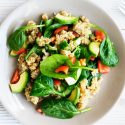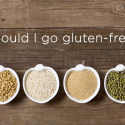9 white foods that should be on your plate
“I don’t eat any food that is white.” I hear this at least once a week from people trying to lose weight and eat healthier. The thought is that “white foods” are devoid of nutrition, and will cause undesirable weight gain. It’s true that foods like white bread, white rice, and processed desserts are no match for whole-grain bread, brown rice, and whole fruit. But don’t count white foods out just because of their color! Here are nine white foods you should be eating:
1. Onions
Also garlic, shallots, chives, and leeks. They are all members of the same family, and are great sources of allium compounds. These helpful phytochemicals (chemicals found in plants) may help reduce the risk of stomach, colon, and rectal cancers. Besides that, allium vegetables taste great and are wonderful flavor enhancers. Use liberally.
2. Pears
Pears are low in calories, a good source of fiber, and awesomely filling. These traits make them a great ally in the battle of the bulge. Fresh fruit in general is high in water content, vitamins, and minerals — and lower in calories. Pears are no exception. They also make convenient snacks for on-the-go nosh sessions.
3. Mushrooms
Mushrooms are a great source of fiber. They make meatless dishes seem “meatier,” sure to please carnivores and vegetarians alike. Mushrooms contain only 45 calories for a whole cup of cooked mushrooms — making them very waistline-friendly, indeed!
4. White fish
Fatty fish like salmon and tuna tend to get most of the attention these days, but don’t forget about good old mild white fish! It’s high in good quality protein, low in total fat and calories. It also packs a nutritional punch with vitamin B12 and selenium. Its mild flavor means it is highly versatile, and can be used in many different recipes to keep meals interesting.
5. Potatoes 
That’s right, I said potatoes! The potato gets a bad rap, but with less than 115 calories, and a sizable amount of potassium in a small baked potato, it’s definitely a food to rethink! Potatoes are cheap, and most of us don’t come close to the recommended intake of potassium or fiber, making the humble spud a nutritional workhorse! Just steer clear of calorie- and fat-laden toppings like butter, cheese, sour cream, and bacon. Stick to fat-free Greek yogurt, lean ham, and steamed broccoli for toppings to ramp up the excitement factor!
6. Parsnips and turnips
People rarely consider these low-calorie root vegetables. They taste great in soups or stews, or just roasted with a bit of oil. Plus, they have a long shelf life. Parsnips and turnips are good sources of fiber, and contain a good amount of vitamin C. A great way to add bulk to your meal without overdoing it on calories.
7. Cauliflower 
Cauliflower belongs to a group called cruciferous vegetables, which also includes broccoli and Brussels sprouts. These vegetables boast a sulfur-containing phytochemical that’s thought to reduce the risk of certain cancers, like prostate and lung cancer. Try cauliflower roasted in the oven — I bet even your kids will eat it that way!
8. White beans
White beans are packed with protein and fiber — soluble fiber, to be exact. That’s the kind of fiber that scavenges your GI tract for cholesterol and blocks some of its absorption, thereby lowering your cholesterol levels. Toss white beans into soups or casseroles. They are especially tasty on salads.
9. Bananas
Bananas tend to get the short end of the stick as far as fruit is concerned. But consider this: bananas, while a little higher in calories than some other fruits, are still a low-calorie snack. They are also a pretty good source of potassium, manganese, and vitamin B6. Bananas contain hunger-busting fiber, are great portable snacks, and are the most affordable of all fruits. So stop monkeying around and get a bunch!
What white food are you going to reinstate in your menus?










